Featured Story: Research of bias in bird specimen collections
Scroll down to read Earlham student spotlights.
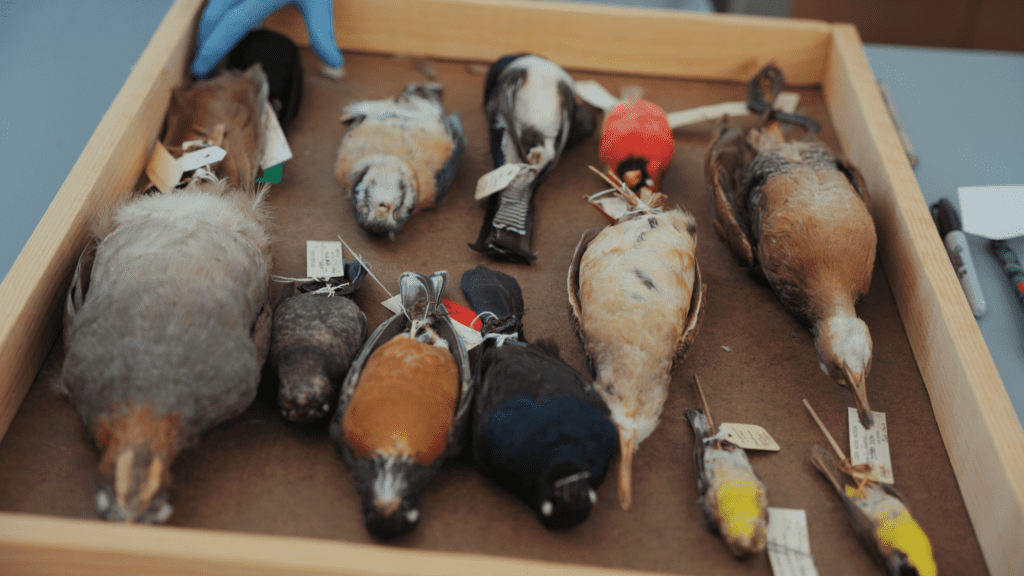
In summer 2023, five students took part in a collaborative research project of epic proportions. Officially known as ‘The Analysis of the Breadth, Depth and Bias of the Joseph Moore Bird Collections,’ the study examined over 5,000 bird specimens belonging to the Joseph Moore Museum while reviewing and logging their datapoints.
Museum director and biology professor Heather Lerner spearheaded the project, along with support from fellow faculty member Jaime Coon. “We’re looking at characterizing the bird collections in the Joseph Moore Museum,” Heather shared. “We are wanting to know how representative our collection is for Indiana’s biodiversity. We’re working with another researcher here—Jaime Coon—and she’s helping us analyze this data.”
The idea behind the project started with a question that Heather explored with her students. “We started thinking about the objects that we have, and wondering what kinds of bias we introduce when we choose to collect—or not collect—something,” she explained. “We said: It would be really interesting to know if we collect more male organisms, or more female organisms—or does it at least represent the proportion of males and females you would find in the wild?”
The museum’s impact within the wider research community is notable, and examining bias within its collection has implications that go beyond merely satisfying curiosity. “We are one of the only places that collects for Indiana,” Heather explained, “which makes it really important to know: What do we have representing Indiana over time? How is that biased, and what does that say about our ability to do research down the road and to understand biodiversity here?” She continued, “We have 30 percent of all birds ever collected in Indiana in our collections. So, for Indiana, we’re very significant. If you want to study avian biodiversity in Indiana using specimens, we hold the most of any institution—so you would come here, and people do! We know that, but to see the numbers was really important.”
Examining bias: The details are in the data
Multiple factors could contribute towards an imbalance in the male-to-female collection ratio. In avian populations, brightly colored plumage generally corresponds to male specimens, which could attract the attention of bird collectors and museum curators based solely on visual appeal. In the wild, male birds also tend to exhibit aggressive behaviors more frequently, putting them at greater risk of collisions or becoming entrapped in snares, and increasing their likelihood of being found through salvage collecting.
A bias towards male specimens—even an unintentional one—has the potential to misdirect research by inadvertently misrepresenting the bird population, and even by finding its way into published literature about bird species. The museum’s summer research project stemmed in part from this exact concern. Heather explained, “I suspected that we collected males more than females—for a number of reasons—but one of the big things that sent me down this path was looking at how species are described. They’re often described from a single individual, and that individual is almost always a male. So, that is not great. That is structural sexism in scientific research.”
Prior to this summer research project, the ability to fully analyze the museum’s collection was relatively limited due to incomplete digital records. Although the collection itself has long been considered important—both anecdotally, and through a multitude of published research papers—it wasn’t until recently that any form of widespread, digital characterization of the collection existed.
“In fact,” Heather said, “We tried to apply to the National Science Foundation for funding to do a big, wholesale digitization, and they returned our application and said: ‘Well, you don’t know what you have… so we can’t tell if it’s important… so we can’t fund you to figure out what you have.’”
Despite this disappointing roadblock, funding was eventually secured through another federal agency—The Institute of Museum and Library Services—which made it possible for the digitization process to begin. The extent of the collection’s informational gaps wasn’t discovered until later, when two Earlham students (Hannah Grushon ’23 and Nathen Peck ’24) reviewed the available records to take a preliminary look at potential bias in the collection.
“What they found was, a couple thousand of our records didn’t have sex ID,” Heather explained. “We could tell that from what we had identified, there was male bias. But if you look at all of the specimens, we had so many that we just didn’t know. Before we could actually use this data, we needed to go back and look at every single specimen, check the ID for its taxonomy, as well as check if it was male or female.”
To tackle a process of this magnitude, a full-scale summer research project was outlined and approved for funding, and the team of students assembled. The deep dive took several weeks of continuous work as students handled thousands of bird specimens, reviewed archived collector journals, and spoke with professor emeritus Bill Buskirk ’66 and alumnus Alan Simon ’76 to contextualize the collection from a historical perspective.
Megan Steinhiser ’24, one of the five student researchers on the team, described the day-to-day cataloguing process. Small groups handled the specimens one-by-one, checking their tags for any information already provided. “It’s things like: where they were collected, who collected them, the species, and any measurements that were done,” Megan explained. The data was then cross-checked digitally to verify for accuracy and completion.
“If there’s anything missing that we can tell from the skin (whether it’s the sex of the bird—and we can determine that from the plumage) we’ll go and fix that,” Megan said. “We just work tray by tray, and eventually, we’ll have all of the data collected and it will all be cleaned, and then we can synthesize results from it.” She added, “The collection is almost 6,000 birds. We’re not doing things like tissues or nests—so we’re just looking at skins, skeletons, and our taxidermy. We usually average around 200-300 birds per day.”
Student researcher Abby Shuck ’23, who also served as a Collections Assistant, said, “I have worked with museum for most of my time at Earlham, and you always get to see little bits and pieces of the collection. But we’re seeing every single bird through this research, so it’s really cool to see all the things that you usually miss.”
As another important component of the study, students worked to identify not only the sex and taxonomy of each bird specimen, but also the genders of their respective human collectors and preparators to look for any possible correlations. AJ Smith ’26, a student researcher and biology major explained, “We’re trying to figure out the correct genders of each collector without assuming—even though many of them are dead—because we’re also looking into: Do males collect more males? Do females collect more females?”
Although this particular hypothesis was mainly disproven, the search for the additional data proved to be an interesting additional challenge. “Museums hold all of this past information” Abby said, “so it might not have been information that was collected at the time—but you can use museum collections to go back and get that information.” Throughout the study’s duration, database updates were made on a day-to-day basis, a method that provided an unprecedented chance to examine the data trends in real-time as they emerged, which Heather described as an exciting career-first.
Student researcher Hannah Grushon ’23 described the importance of performing this type of evaluation on an ever-evolving collection, saying: “This research can inform how we might collect in the future. Right now, we rely mostly on salvage collecting, which is just picking up birds that have already died. If we know what we’re short on, or what we might need to focus on collecting in the future, then we can adapt to more accurately represent the wildlife around Richmond and around the world.”
Earlham leads the way with professional-level research opportunities
The chance to conduct research alongside faculty is typically reserved for graduate-level students at most other institutions, but at Earlham, it has become a hallmark of the student learning experience.
“This is really a graduate level research project,” Heather confirmed. “It’s neat to see the students doing this high level of research. For some students, research experience is a required component of their major, so these experiences are absolutely essential! And for students who are not in those majors, we know that a research experience outside of the classroom is critical for their career discernment and preparation.”
As with all research studies at Earlham, the students involved are able to gain valuable experience across a variety of interests and career goals. “I am starting to apply to veterinarian schools, and I really want to focus on birds,” Megan Steinhiser shared, “and being able to see them up close—even through just doing the specimen preparation myself—I’ve learned a lot about anatomy. I’ve recently taken Ornithology, and so I get to use the skills that I learned from that in this, so it’s been really great.”
For Abby Shuck, working hands-on in the museum aligns directly with her future plans. “I would like to continue working in museums, and continuing to do this type of research. Working with the other students is also good, because I’m expanding my circle of people who love museum work,” she said. Even for students whose academic majors or future plans correlate less directly, the experience still makes a valuable impact. “What’s been amazing over the years as I’ve worked with students is that they go on to use this in so many different fields,” Heather said. “Sometimes, it’s actually just the attitude change—the confidence builder—that the research does.”
Faculty members at Earlham also benefit tremendously from the opportunity to research alongside their students. “I specifically chose to be a faculty member at Earlham, because while research is an expected part of my job here, conducting research with students is more valued than ‘research for the sake of research,’ or for securing external grant funding,” Heather said. “My professional life is dedicated to supporting student growth through classroom and experiential learning, so having college support to conduct research with students aligns perfectly with my own mission. While I could conduct more research—or more in-depth research—by working just with established scientists, I find the process of mentoring undergraduate students during research experiences far more satisfying.”
Donor generosity fuels the collaborative research engine
Projects like this one would not be possible without the generosity of Earlham donors. “This year, we received an extra donation from Alan Simon directly to the museum to support this specific collections-based project,” Heather shared. “In addition to providing support for student wages, he also brought us a large selection of books that were essential for us to be able to identify species and sex in the birds we were studying. We would not have been able to complete this project without both his financial and literary support!”
Additionally, The Stephen and Sylvia Tregida Burges Endowed Fund, which was established to provide research opportunities in the sciences, helped cover major costs associated with this particular research project. In a true mark of Earlham’s philanthropic spirit, a variety of funds at the College have been created by donors, earmarked specifically for collaborative research, and endowed to help ensure that both the funds themselves and the research projects they support will continue to live on in perpetuity.
Securing continued funding for collaborative research is an important priority for donors and the College alike. As part of the current For Good campaign, Enrich the Epic Journey is a pillar that seeks to raise $35 million, part of which will empower collaborative research across all areas of academic study through exciting new projects and future research trips. To directly support collaborative research at Earlham, you can make a campaign gift by choosing “Enrich the Epic Journey” as your designation, and selecting “Student/Faculty Research” from the available drop-down options.
Helena Aleluya Jose ’25
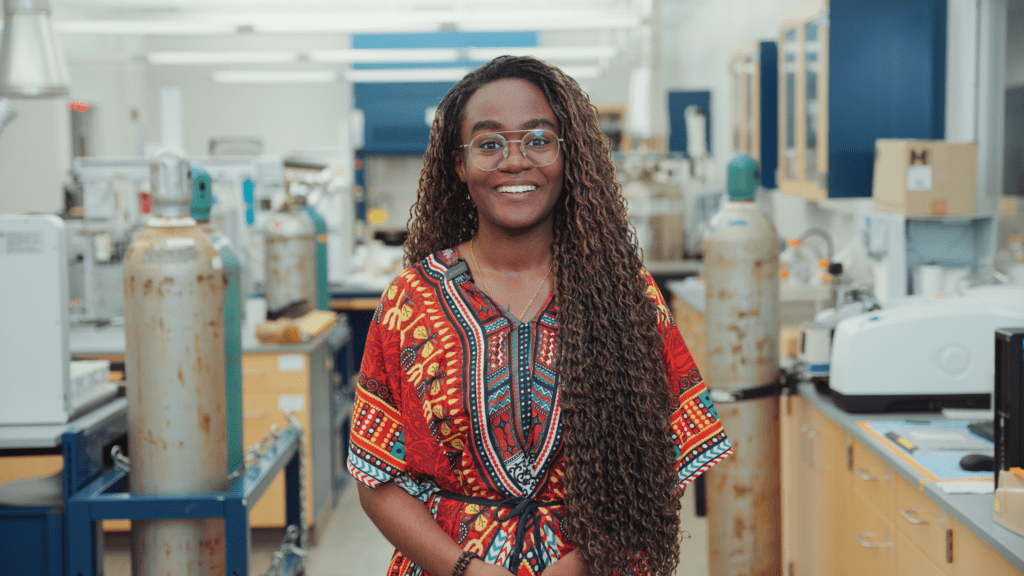
Computer science and theatre
While some Epic Journeys happen far from Earlham’s campus, sometimes the most enriching experiences happen right in Earlham’s backyard. That’s true for Helena Aleluya Jose ’25, who used her Epic Advantage to participate in an innovative faculty-led research project focusing on how sunlight breaks down pharmaceuticals in the environment.
Using computational chemistry—a mixture of chemistry and computer coding—Helena worked on developing a model for the degradation of pharmaceuticals that end up in lakes, rivers and streams. When those chemicals build up, they can negatively affect wildlife. Knowing exactly how quickly certain chemical components of drugs break down, and what factors influence the rate they’re breaking down, is an important step towards managing their impact on the environment.
Helena says the research project perfectly combined her passion for computer science and environmental justice and that it’s been exciting to be directly involved in a project that in the future could reduce the negative impacts of pharmaceuticals on wildlife and nature.
The work was done under the guidance of visiting assistant professor of chemistry, Bailey Bowers. “Bailey is a terrific teacher,” Helena says, “she makes it such a safe environment for you to make mistakes. She gives you the time to learn and to apply what you’ve learned.”
For her part, Bailey says it’s been rewarding to work with students who are so excited and eager to learn. “Research never goes how you think it’s going to go, and these students are so persistent and have such a good attitude about it.”
Bailey also notes that students are gaining more than just research skills. “The value of this one-on-one mentored research is so immense. You build scientific knowledge and soft skills. You get a sense of how research works and how it’s often not linear, and that you have to adapt as it’s happening. And those things translate to almost any workplace.”
In addition to this exciting summer research, Helena also traveled to Scotland with the Department of Theatre Arts to perform at the Edinburgh Festival Fringe. The department performed an original play in Scotland that debuted on campus.
Experiential learning opportunities like these are key to empowering students to pursue the positive changes they want to make. It gives them the practical skills they need, in a safe environment, where they can learn from professors who believe as strongly as they do in making an impact. It’s one step along the path of showing Earlham’s talented, curious, and compassionate students how to achieve the better future they already imagine for Earlham and for the world.
Moises Zacatelco ’26
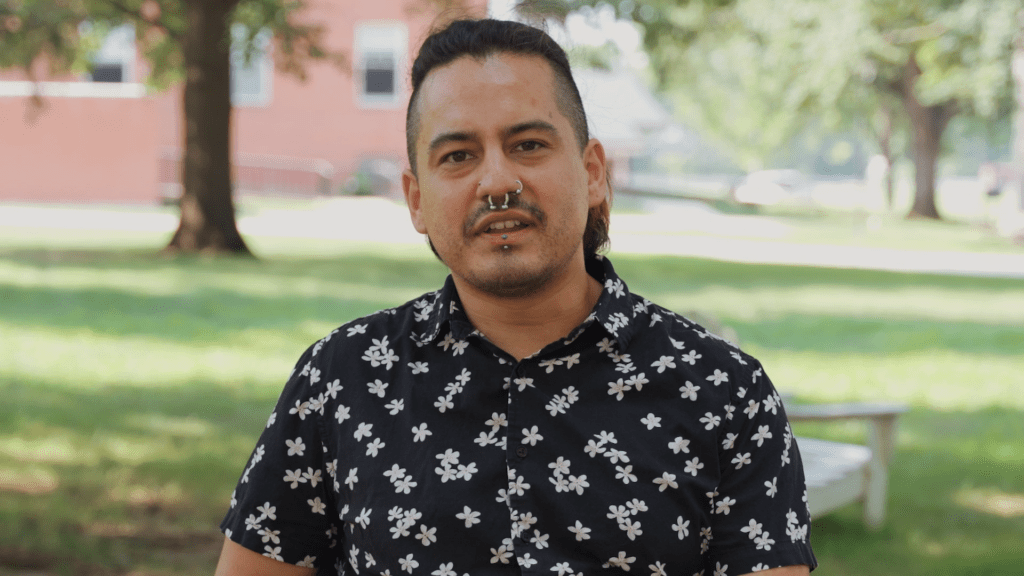
Environmental Sustainability
Earlham was a part of Moises Zacatelco’s ’26 life long before he was able to attend as a student. “Growing up in Richmond, I always thought Earlham was an interesting place,” he says. “When I was a teenager, I would come here and hang out and make friends.”
It wasn’t until recently though that attending college became a real possibility for Moises. “The biggest barrier to attending Earlham was an economic one. The INspire Earlham program is the sole factor that allowed me to come to Earlham.”
Through the INspire Earlham program, income-eligible Indiana students can attend Earlham tuition-free. By widening the path to a four-year college education for Indiana students, Earlham is providing a bridge between the potential and passion students have and the skills and opportunities they need to achieve the positive change they imagine for the world.
Moises recently channeled his passion into an internship with Amigos, a Richmond outreach center that empowers the Latino and Hispanic communities and promotes learning, cooperation and respect across cultures. “I wanted to work at Amigos for a lot of reasons,” says Moises. “My father was an immigrant, and when he came here, there were very few resources for immigrants. So I just thought it would be a cool way to try to help provide assistance to people in a similar situation to what he was in 40 years ago.”
Moises found the internship rewarding in many different ways, including the opportunity he had to teach English as a second language (ESL), which he had never done before. “My supervisor was adamant that I just try and I actually really love it. It’s been really great meeting with all these adult ESL learners and getting to know them and help them achieve their goal.”
INspire Earlham has not only allowed Moises to attend college but has also enabled him to give back to the Richmond community. He sees the relationship between the two as a natural fit. “Richmond is a town full of potential and full of people who want to do good things and I think the majority of Earlham students feel the same way about themselves.”
Nico Quijano Franco ’23
Psychology
Earlham senior Nico Quijano Franco is one of 10 global leaders chosen for the Future Nobel Laureate Scholarship in 2023.
Quijano Franco will travel to Sweden in December 2023 on an all-expenses paid trip to participate in the Nobel Week Dialogue in Gothenburg, Sweden. The annual event brings some of the world’s leading scientists, policymakers and thinkers together to explore scientific topics through a global lens.
“Being chosen as a Future Nobel Laureate Scholar is an opportunity that I thought I could only dream of,” said Quijano Franco, a psychology major minoring in public health and business.
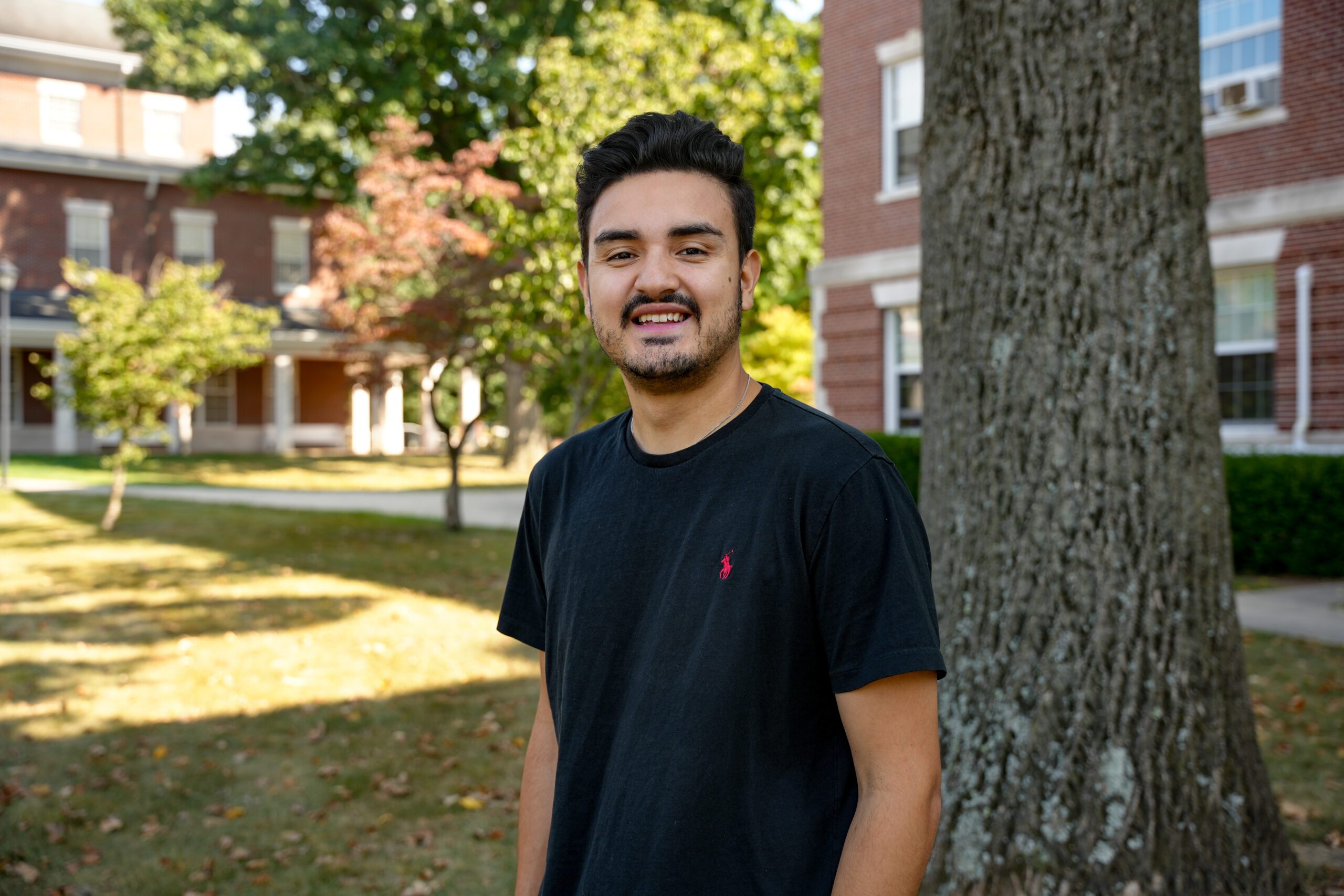
“We are a cohort of students studying at colleges and universities not only in the United States, but in locations around the world,” he said. “One of the scholars is from the same city I grew up in Bogotá, Colombia. We all want to make the world a more equitable and just place.”
The scholarship will further Quijano Franco’s research interests in healthcare and help him pursue a career in public health.
Under the mentorship of Center For Global Health Director Peter Blair, Quijano Franco participated in Earlham’s medical interpreter and cultural competency programs and interned with several healthcare facilities near campus, including Reid Health and the Neighborhood Health Center. With support from the College’s Epic Advantage program, he participated in a paid summer internship with the Oregon Health and Science University in Portland. He also credits the Center with helping him strengthen his successful application for the 2023 scholarship in Global Health from the Flywire Charitable Foundation. The scholarship is awarded annually to a student with a demonstrated commitment to promoting health and well-being on a global scale.
Last spring, he participated in Earlham’s semester abroad in New Zealand, and pursued a research project that examined the healthcare practices of the Māori, an indigenous Polynesian community that is the second-largest ethnic group in the country.
“I believe it is essential to preserve cultural customs and decolonize the healthcare field,” he said. “My academic and volunteer work has taught me that preserving cultural customs is vital because cultural practices and knowledge systems contain valuable information about how to live in harmony with nature and with each other.”
Clayton Snider ’25
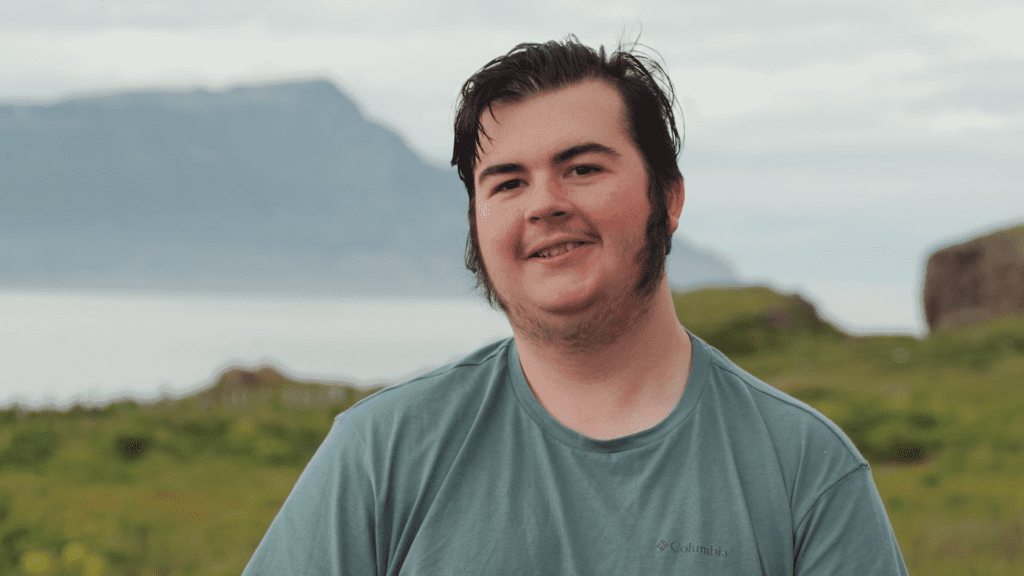
Biochemistry
Before enrolling at Earlham, Clayton Snider ’25 had never traveled more than two hours away from his Indiana home. But when he learned his Epic Advantage funding would cover the costs of an experiential field research trip to Iceland, he embraced the opportunity completely.
“What better way than to throw yourself into the deep end and see what happens?” He says. “There have been a lot of firsts this trip. First time seeing mountains, first time seeing the ocean, first time being on a plane.”
Clayton experienced all of this through Earlham’s Iceland Field Studies program, a multidisciplinary science-based experience designed for students to immerse themselves in an intensive exploration of the environment and culture of one of the most unique places on the planet.
That meant Clayton had a variety of hands-on research opportunities, from drone photogrammetry on top of a glacier, to analyzing e-DNA samples to monitor the health of a fjord, to assisting with drone surveys of invasive plants. Clayton’s time in Iceland resulted in one big takeaway. “I’ve loved this. I need to do this more, find other places and go there. Just the experience of totally new things that I never would have seen or heard or tasted.”
Without funding from Earlham, Clayton never would have been able to go on this trip. The Epic Advantage, he says, “gives people like me the chance to travel and see things they can only hope of and that’s a wonderful thing.”
Clayton loved every minute of his time in Iceland, but one of his favorite parts came right at the beginning of the trip. “That first take off of the plane was the most beautiful thing I have ever seen. Just taking off and watching everything shrink underneath you and being able to see it all from a perspective that I had only dreamed of previously.”
That’s exactly what the Epic Advantage can unlock for Earlham’s students. A new vantage point with new possibilities that expand both what the world looks like, and what is possible for them to achieve within it.
Robert Lemon ’24
Biochemistry
When Robert Lemon ’24 starts talking about the research on pain he participated in during a summer internship, his enthusiasm for the subject is hard to miss. His smile grows wider as he explains the intricate neuroscience mechanisms behind the causes of pain, the experiments on mice he’s helped run and the excitement he’s found for learning the complexities of this particular area of science.
Robert didn’t always know that pain research would become his focus. In fact, he didn’t even know about the biggest pain-related crisis in the nation until a professor shared a story about opioid addiction in one of his Earlham classes.
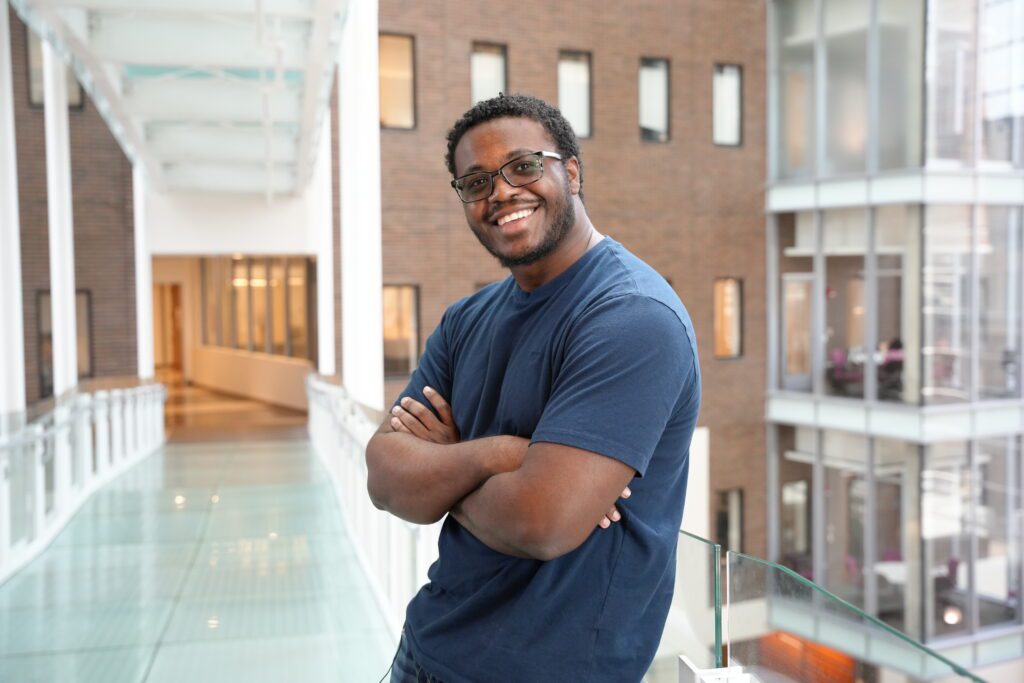
When he heard the story he immediately thought, “there’s a problem here, and I feel strongly enough about it to fix it, or at least to play a part in fixing it.”
With that in mind, Robert began searching for an internship that would let him explore the science behind pain. When he couldn’t find a traditional internship opportunity, he applied for and received the Libby Yunger Academic Opportunity Endowed Fund through the Earlham Center for Global Health (CGH).
With the money from CGH and additional support from the McNair Postbaccalaureate Achievement Program, he was able to take a position at the University of Cincinnati Medical Center at the Steve Davison Lab. The grant, he says, “was a fundamental part of me having the confidence to reach out and ask for positions in these labs, because without it, I wouldn’t be able to support myself.”
The lab studies the affective dimension of pain in mice, using neuroscience to better understand the underlying mechanism of pain and discover new ways to help people who are suffering.
“A lot of stuff went over my head in the beginning,” Robert says, “but even through the challenge of learning that information, I found myself getting more and more excited as I got more and more information.”
Throughout the summer, Robert ran tests on mice, read a lot of research papers and gained a new perspective on what pain research looks like. “I wouldn’t have thought of any of the things I’ve experienced now, and I think that mind and eye-opening experience was more than I could have asked for over the summer.”
The internship also cemented his plans for his future, which will include a lot more research. Instead of just applying for a doctor of medicine program, he now plans to spend another year in a lab and then apply for an M.D-Ph.D. program.
As for the impact of the work he’s done so far? “When you’re in the middle of it, it’s not as present in your mind as you would think it would be. When I take a step back and look at it, that’s when it hits.”
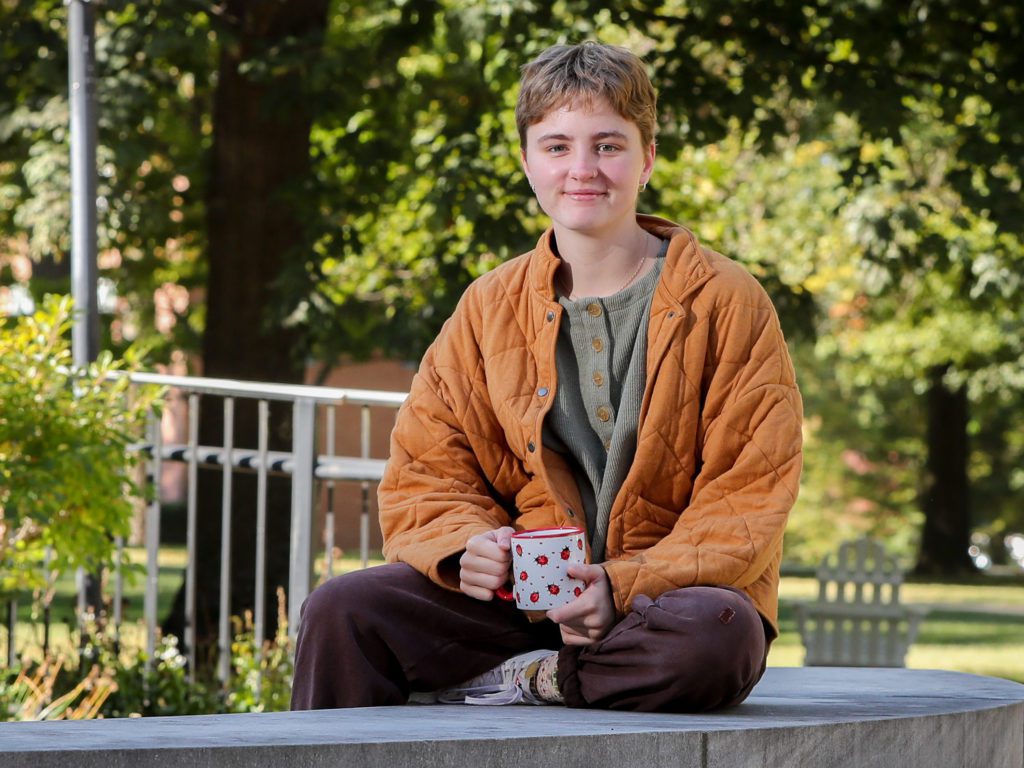
Hazel Jordan ’24
Biology
For many prospective college students, scholarships and financial aid packages play a huge role in not only where they choose to go to school, but also whether they stay. Widening the path to an Earlham education while enriching and elevating the student experience will ensure that there are more Earlhamites doing good in the world. Continuing to offer robust scholarship and financial aid opportunities is imperative to seeing these goals through.
For Hazel Jordan ’24, a combination of financial aid and Earlham-specific scholarships were the determining factors in their choice to attend Earlham.
Jordan, who was raised Quaker, first heard about Earlham in their quarterly and yearly Quaker meetings and the Friends General Conference. People in these spaces spoke so highly of Earlham that Jordan knew they wanted to apply.
“Scholarships completely impacted my college decision,” says Jordan. “With the scholarship opportunities that I have here, Earlham was the best financial option for me.” While they have an on-campus job at the greenhouse, Jordan acknowledges that without their scholarships, their academics and social engagements would suffer as they’d be required to take on more work. “I have to feel centered to […] take in new things and learn in a deeper way,” says Jordan. “I’m able to do that here without financial stress taking up space in my mind.”
During their time at Earlham, Jordan has engaged in the Richmond Residency program working with the Parks Department, collaborative summer research analyzing the carbon sequestration forest on campus and the Quaker Fellows program. Jordan also had the chance to work at a non-profit science summer camp, which was made possible through funding from their Epic Advantage.
Going to Earlham presents the opportunity for students to encounter new perspectives, widen their world views and deepen their understanding about themselves and the world around them. “Being able to grow and be myself here at Earlham has been amazing,” says Jordan. “I recognize that not everybody gets this chance.”
Ford Twumasi ’25
Math and Business
Ford Twumasi ’25 was just getting settled in for his freshman year when tragedy struck at home in Ghana. Fire swept through his mother’s business, and in an instant, everything changed.
Ford’s father passed away several years before, and the loss of his mother’s income made his future at Earlham uncertain.
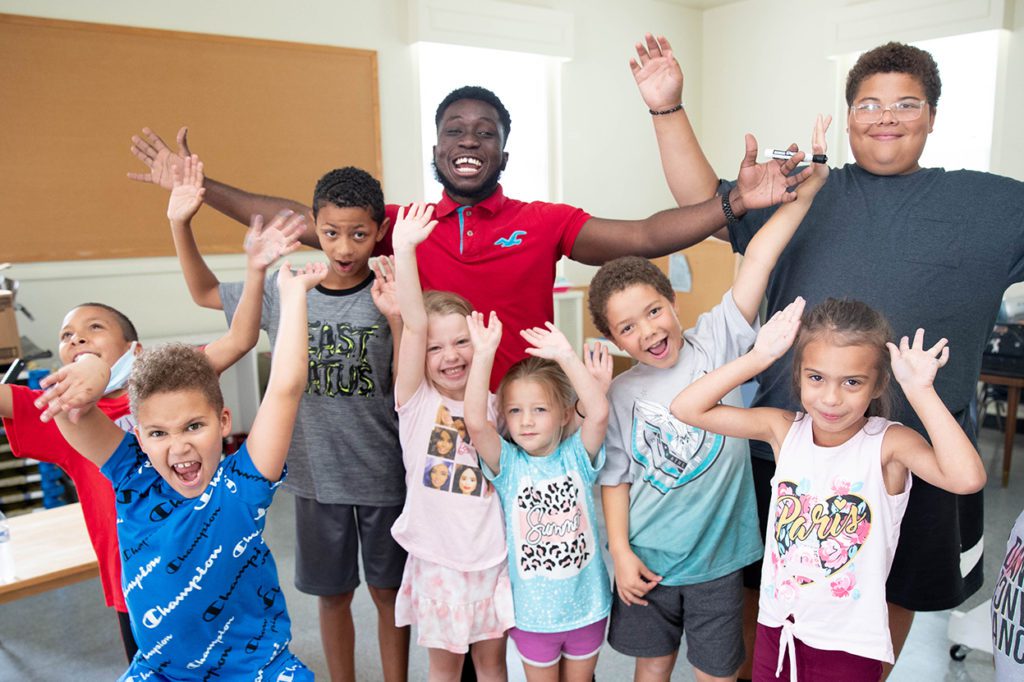
“I didn’t know what to do,” Ford recalls. “That first semester was crazy.”
Situations like these are why the Clarence Cunningham Student Emergency Fund exists: to help students persevere in times of unexpected need. In Ford’s case, disaster struck. Sometimes the need is smaller but no less immediate—like the student who comes to Earlham from a warmer climate and can’t afford a winter coat, or the student facing food insecurity during a holiday break. For Ford, the support of the College and its donors meant he didn’t need to transfer or go home.
“Circumstances like this happen. Stuff like this happens,” says Ford, who plans to declare a major in math and business. “I love this place, and I’m so thankful that Earlham and its donors were able to jump in and provide me with support. That means so much to me.”
Since then, Ford has made the most of his time at Earlham as a member of the Men’s Volleyball Club, the Net Impact Club and Students for Peace and Justice in Palestine. He is also a convener of Student Activities Board, a volunteer with WECI-FM, a peer career coach and a resident assistant. He spent the summer of 2022 teaching math to local children through the Townsend Community Center as part of the Richmond Residency Program.
“Every institution I join—whether it’s a club or a college or my church—I try to be a member, not a number. I want to help the community, and I like to be involved,” Ford says. “Earlham is not just a good place for me, it’s the only place for me.”
Rutendo Magade ’23
Physics and Global Management
Rutendo Magade ’23 has found that Earlham’s commitment to the liberal arts has given her a sense of academic freedom. This commitment has allowed her to pursue a double major in physics and global management while she hones the skills needed to create her magazine, Munaku.
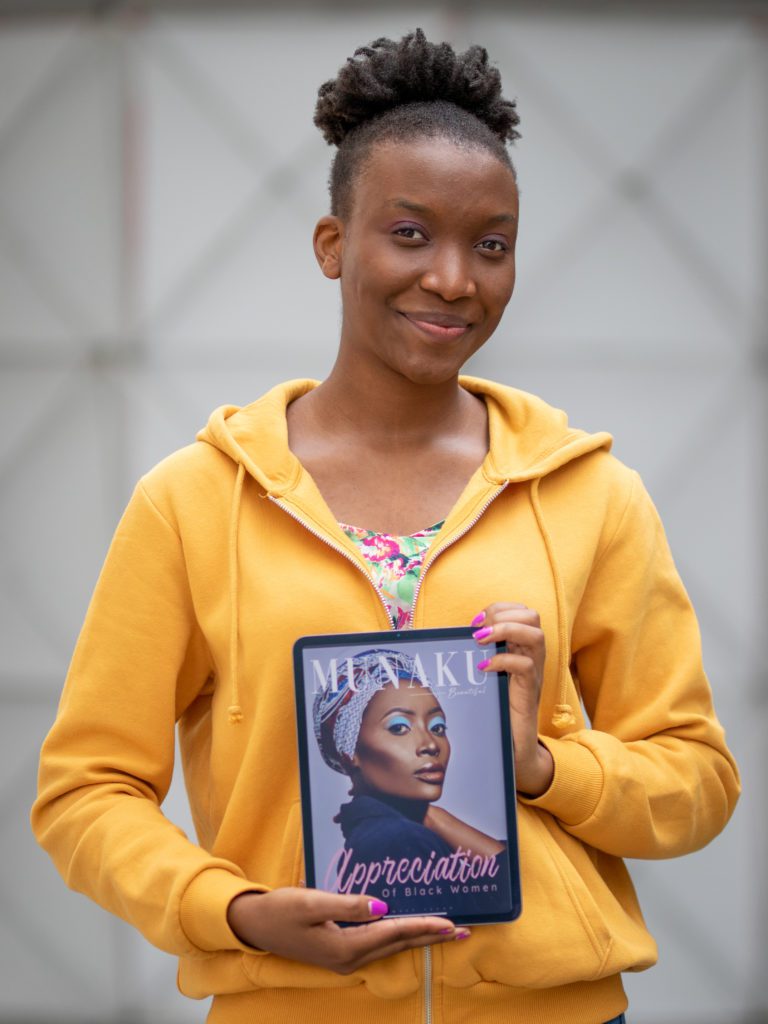
Munaku means beautiful person in Shona, a language in her native country of Zimbabwe. The magazine is meant to change the way people with dark skin are viewed in popular culture.
Inspiration for the magazine struck when Magade left Zimbabwe to finish high school in Thailand, where she noticed that Black people were underrepresented in the media. “I just remember feeling like Black people like me are not represented or seen at all in Thailand,” she said. “It’s like a demographic that is unrecognized or ignored.” Most hygiene products that she found in Thailand included skin whitening products, which is something she’s also seen back home and here in the U.S.
Magade saw (and felt) the need for representation of dark skin in media and popular culture, and took direct action to meet this need with the creation of her magazine. Her story reminds us not only of the importance a liberal arts education, but also of the impact Earlham students can make when they have access to the right resources.
Women from America, Africa, and Asia have written articles in Munaku, which speaks to the widespread issue of underrepresentation. Magade is inspired to use her platform to feature Black women and encourage self-love. “This is for Black women everywhere.”
Leigh Siler ’25
Undeclared
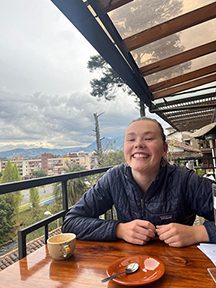
Study abroad experiences give students a unique opportunity to see the world through a new lens and meaningfully engage in cultural humility. For these reasons and more, off-campus study is central to an Earlham education. At Earlham, all students are encouraged to apply for off-campus study, which explains why more than 60 percent of Earlham graduates participate in a semester- or year-long program during their Earlham career. For many students, these experiences are made possible through study abroad funding opportunities.
Leigh Siler ’25 made it a priority to study abroad from the moment she stepped on campus. “I believe that an education is much broader than a classroom experience,” she says. “My intentions to travel were rooted in a commitment to learn through curiosity and connection.”
Leigh, who has a fondness for the Spanish language and mountain landscapes, was particularly drawn to the Ecuador program. She also has a great relationship with Rodolfo Guzman, the faculty supervisor for the program.
“Sitting at the dinner table with my host family is a rich environment for talking about politics and religion with my host mom, Elena, or learning about Ecuadorian Tiktok and memes from my host brother, Santiago,” Leigh shares. Moments like these, when connection and understanding are fostered, are reflected in the experiences of many Earlham students who study off-campus.
Considering the importance that Earlham places on off-campus study, it is vital to offer financial support to students who might not otherwise have the opportunity to study abroad. These experiences enrich their education, cultivate life-long relationships and ultimately build an international network of support for Earlham and its constituents.
“Meeting other students at the university [in Ecuador] has proven to me over and over again how eager everyone is to connect and communicate, despite language barriers,” says Leigh. “Ecuador has provided me with the ability to see every moment as a learning experience.”
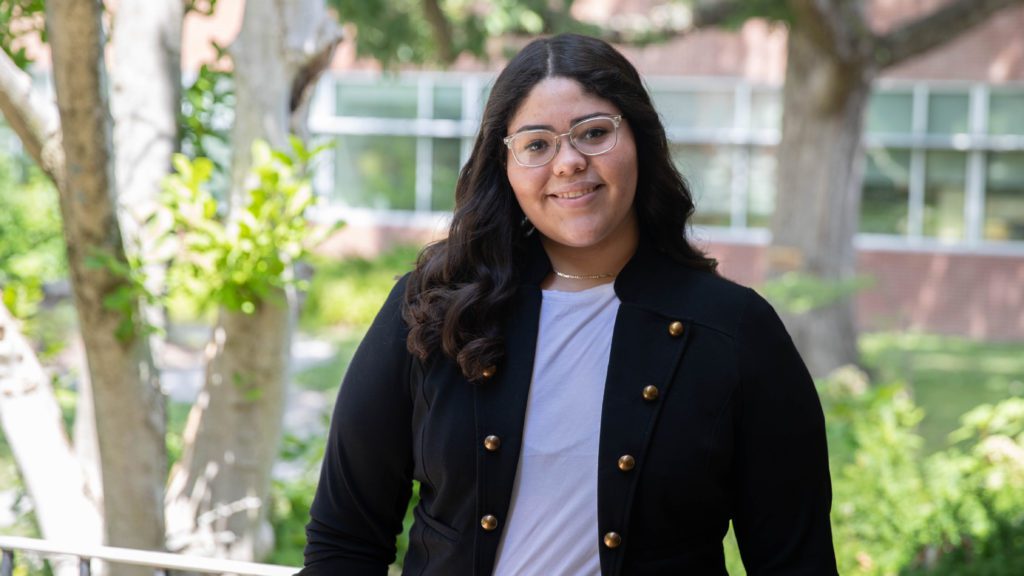
Marisol Cora-Cruz ’23
Neuroscience
Marisol Cora-Cruz ’23 is a neuroscience major with a passion for addressing disparities in healthcare. Marisol was awarded the Barry M. Goldwater Scholarship during her junior year at Earlham, which is one of the top undergraduate awards given in the natural sciences, engineering or mathematics.
“I am underrepresented in medicine,” says Marisol, who plans to pursue an M.D.-Ph.D. program in epidemiology after graduation. “Less than two percent of physicians are female Hispanic—and even fewer of those are physician scientists.”
Marisol has noticed a need for better integration in the fields of medicine and public health, which is why she hopes to both serve as a provider and facilitator of effective communication between physicians and researchers about best practices.
During her Earlham career, Marisol has interned at the Drexel University Dornsife School of Public Health as part of the Intern Philly Program. There her lab focused on researching factors relating to substance abuse, violence, HIV/AIDS, mental health and COVID-19 for the city’s Hispanic population. She has also engaged in public health research at Earlham and the Johns Hopkins Bloomberg School of Public Health. While in Philadelphia, she was the coordinating intern for the Earlham Center for Global Health’s externship program, which provides service-learning opportunities for students at local healthcare facilities.
“I hope to help improve the systems that have limited our access to adequate healthcare,” says Marisol, who has helped care for her mother for most of her life. “My hope is to one day return to serve as a provider and perform very needed research with the patients of Puerto Rico.”
An Earlham education has been instrumental in shaping who Marisol is and how she hopes to engage with the world. In many ways, this education is made possible through gifts to the Earlham Fund, which is used to expand and enrich student opportunities, retain talented faculty, and more. “Not only have I become more knowledgeable through my classes,” she says, “but I have had multiple faculty and staff members at Earlham who have helped nurture and support my passions.”
Isao Sakai ’24
Peace and Global Studies
Sometimes students come in with a plan, but those plans have a tendency to change as Earlham opens the door to new passions and possibilities. That is exactly what happened for Isao Sakai ’24, who discovered at Earlham that he wanted to focus on the underlying socio-political causes of climate change, rather than majoring in environmental science.
“I feel a sense of obligation as a person from a privileged country like Japan,” says Isao, a native of Tokyo, Japan. “I believe we cannot structurally solve [climate change] without addressing the underlying problems [such as oppressive dominance, colonialism, exploitation and patriarchy].”
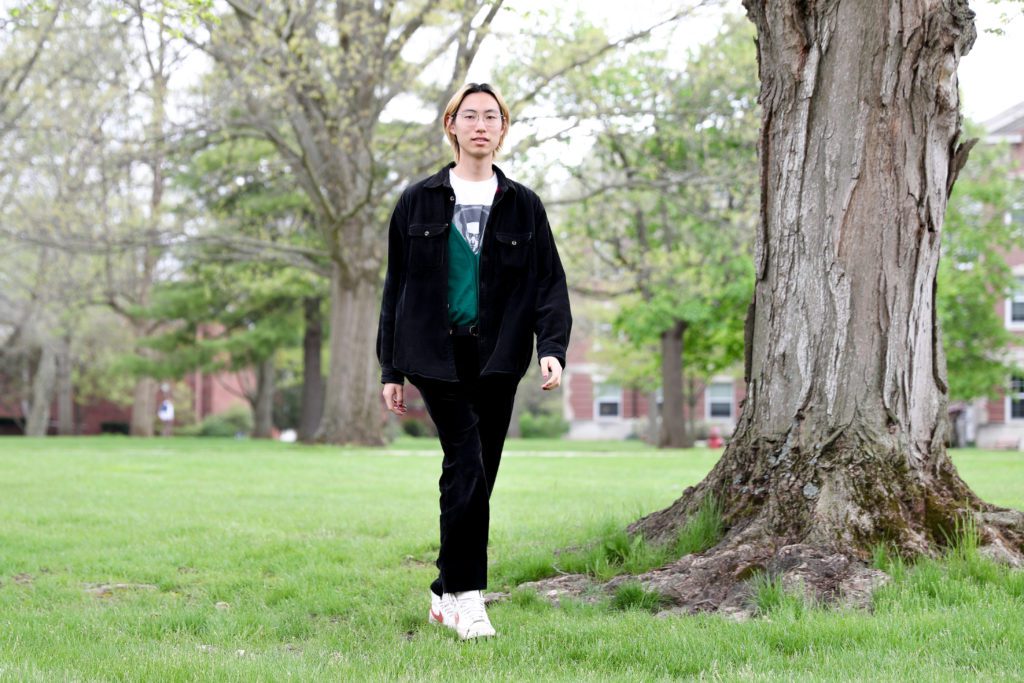
Isao, who co-founded the national youth climate movement called Fridays for Future Japan at the age of 19, had already been the spokesperson for a number of climate strikes before arriving at Earlham. His activism, which has also involved public relations with NGOs, training events for activists and strategizing to challenge the government’s energy policy, has been featured by Bloomberg and earned him a spot on Forbes Japan’s popular 30-under-30 list for 2021.
Earlham attracts students who have a wide range of passions, many of them related to social justice—whether focused on the environment, race, healthcare, violence, income inequality, food insecurity, immigration or others. Gifts to the Earlham fund allow us to continue to support our students as they fight for a more just world in unique and creative ways
“One thing I tell people [who want to get involved in environmental justice movements] is to do something related to your passion,” says Isao, who is now a peace and global studies major at Earlham. “We need more creativity and synergies in order to diversify the ways we address climate change.”
Uapii Kandjoze ’24 and Rose Leon Alvarado ’24
Neuroscience
Earlham is known for its excellent classroom experience, which is reflected in our consistent ranking in The Princeton Review’s Best 387 Colleges. While our leadership in the classroom experience will continue long into the future, opportunities outside the classroom allow Earlham students to put all of their theoretical knowledge into practice.
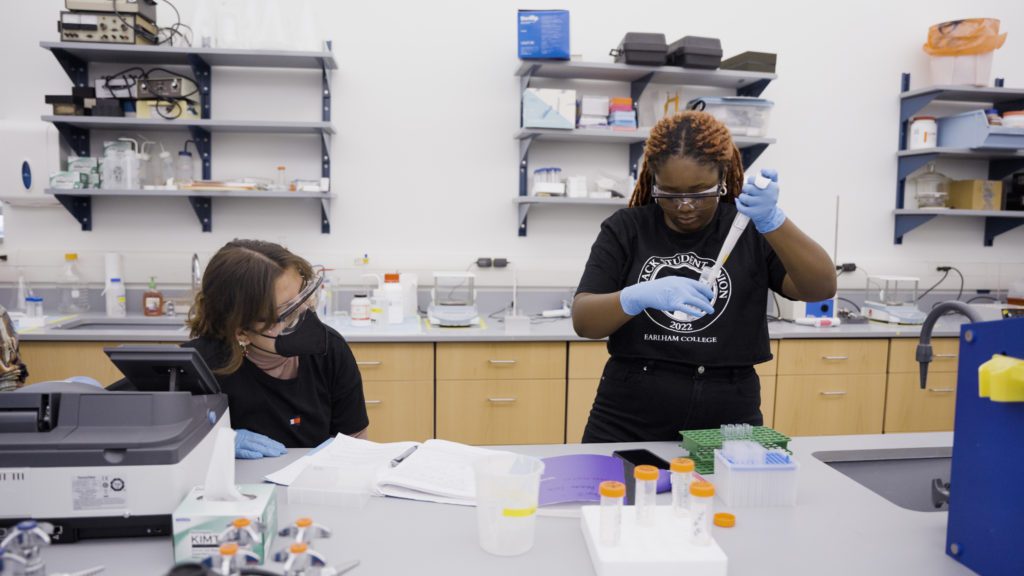
Internships challenge students in meaningful ways and prepare them for their lives after Earlham, regardless of their major or intended field. Despite the myriad ways that internship experiences are critical to a well-rounded undergraduate education, many students are not able to take on an internship due to their financial circumstances.
At Earlham, we believe that every student should have an internship or research experience that allows them to explore their field, gain new skills and build lasting relationships – whether here in Richmond or on the other side of the world.
Neuroscience majors Uapii Kandjoze ’24 and Rose Leon Alvarado ’24 were able to spend their summer in Cleveland, Ohio, at Case Western University working in the lab of Earlham alum, Dr. Andrew Pieper.
Under the mentoring of graduate students, Uapii and Rose were able to study different aspects of the pathology of Alzheimer’s disease and the role of traumatic brain injury on neurodegeneration. Not only did this research experience enrich their Earlham education, it also gave them an opportunity to use their knowledge and skills in ways that will benefit the wider world.
Their research experience was supported by the American Heart Association, and Uapii and Rose were able to present their summer research at the American Heart Association’s Supporting Undergraduate Research Experience Summer Program Symposium. Internship and research opportunities like this one are instrumental in preparing students for their future careers. Our ability to fund these experiences with donor support makes internship experiences more accessible to all Earlham students now and in the future.
The Clarence Cunningham Fund
Earlham students inspire us every day as they reach academic milestones, take on new leadership positions and engage in necessary difficult conversations. These are the anticipated challenges that help our students grow. However, students also inevitably face unexpected circumstances that leave them in need of financial support. The needs are varied and unpredictable, but time and experience have shown us that there will always be a need for emergency funding.
We have created the Clarence Cunningham Student Emergency Fund so we can continue to meet these needs. This fund bears the name of Clarence Cunningham, Earlham’s first Black graduate, both to honor him and acknowledge that he was not supported in the ways that we hope to treat students today. Students should be able to turn to Earlham, for example, or if they need to fly home for a family emergency.
We know that financial burden does not happen in a vacuum, and this discretionary fund will allow the Office of Student Life to offer emergency aid to students through a lens of social justice.
“It’s important to endow this fund because this need will always be present,” says Bonita Washington-Lacey, vice president for Student Life and dean of students. “Having this funding available gives us the opportunity to continue the legacy and commitment of giving our students what they need without challenging or diminishing their financial aid package.”
Washington-Lacey, an Earlham graduate herself, felt the impact of receiving support as a student and has seen how necessary this type of funding is for students today. “For those of us Earlham grads, I think it’s safe to say that we all experienced help while we were here, and now it’s time for us to pay it forward,” says Washington-Lacey. “I want students to feel open, supported, empowered and comfortable knowing that when they’re vulnerable, they aren’t alone.”
For the birds (literally)
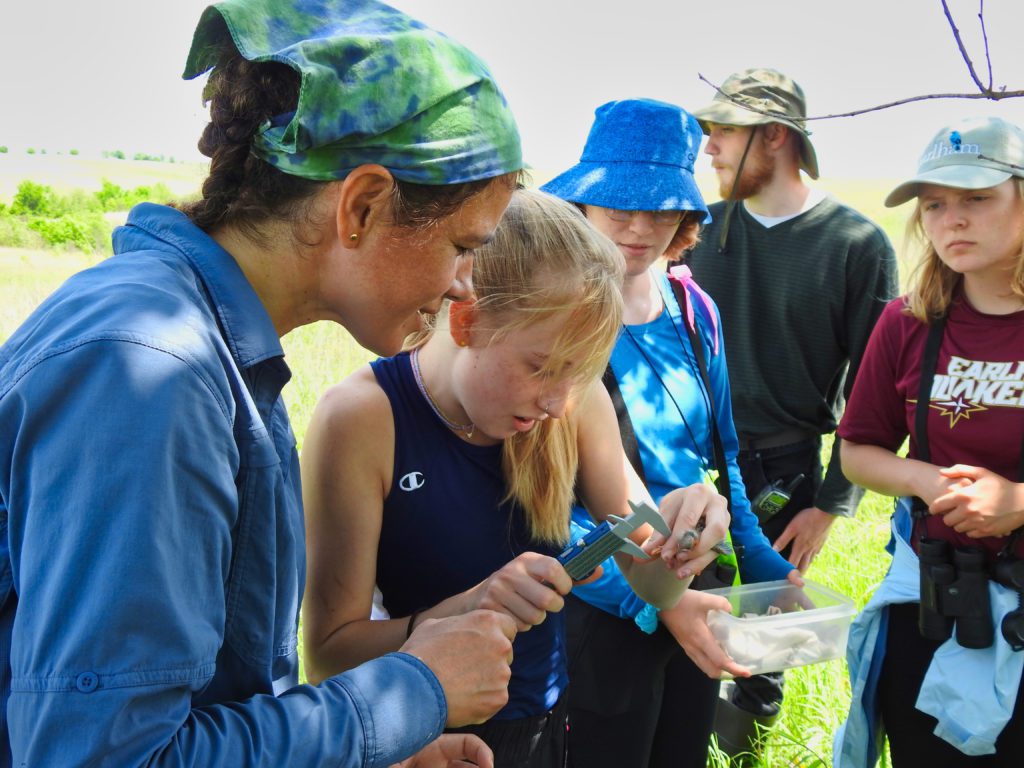
Biology majors Hannah Grushon ’22 and Thea Clarkberg ’22, along with a team of Earlham students, were able to join Earlham professors Jaime Coon and Wendy Tori during the summer of 2021 as they traveled to the Grand River Grasslands in southern Iowa. During this trip, the student-faculty team collected data, recorded nesting behaviors and assessed native plant communities in these highly threatened ecosystems.
“All of those technical skills we’ve learned will transfer to any kind of research that I do in the future,” says Clarkberg. “This opportunity has really helped me better understand what I want to do after Earlham.”
An Earlham education is a transformative one, in part because of experiences like this. “Our students are very motivated to fully immerse themselves and use the knowledge they have learned to solve real world questions and make a difference,” says Tori, who has had many opportunities to conduct and present research with students over the course of her career at Earlham.
In addition to joining the research experience in Iowa, Grushon had the opportunity to present at a conference with Coon and Tori about their research on the declining ecosystems of grassland birds. Experiences like this give students the chance to dive into research areas they are passionate about as they build transferable skills including data analysis, effective collaboration and compelling public speaking. Funding for these opportunities makes it possible for Earlham students to engage in meaningful research that prepares them for their future—for good.